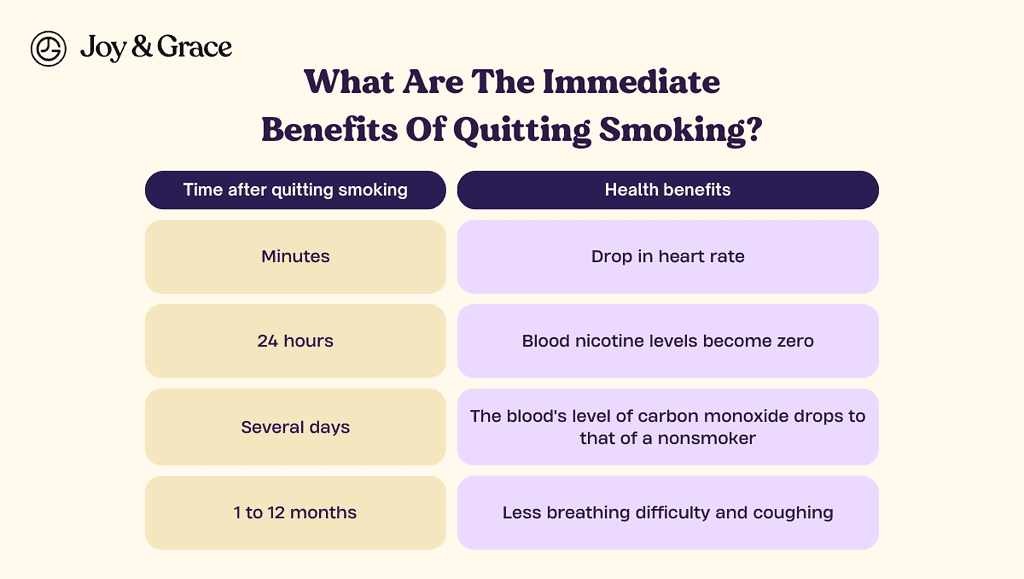Neck pain is a common complaint, and various risk factors can contribute to its development. Knowing how harmful the habit of smoking is, it is only natural to wonder if it could also be one of these risk factors.
On the other hand, vaping seems to be on the rise; could it also have a hand in neck pain?
We will be reviewing all of these to try and see if there’s a link.
What is no secret, however, is that quitting smoking has many benefits for our health. So. we will dive down into that part as well.
Let’s get going!
How Does Smoking Affect Neck Pain?
Smoking can cause increased degeneration of the intervertebral discs in the neck. This can lead to or increase neck pain.
This is at least what a study among Chinese adults suggests.
The study's authors looked at 320 people with neck and shoulder pain who went to a spine disease department.
Based on how much they smoked, the patients were put into three groups: active smokers, passive smokers, and people who had never smoked.
Then, the researchers looked at the neck scans of the patients to see if there was a difference in cervical disc degeneration between the groups. They also asked the patients to rate their pain on a scale.
The study's results showed that:
- People who had never smoked had less severe cervical disc degeneration than either passive or active smokers.
- These damaging effects of smoking are more noticeable in women than in men.
- The more and longer a person smokes, the worse their cervical discs get.
So, although there’s probably a need for more studies of this type, the data seems pretty straightforward.
Smoking can indeed negatively affect neck pain.
Smoking also doesn’t seem to help people who try and relieve or distract themselves from chronic neck pain.
In fact, this kind of behavior is proven to be even more harmful.
Studies suggest that people with an avoidance-type of coping have a longer neck pain duration.
We have also discussed this part in more detail below in the article.
Could Vaping Lead To Neck Pain?

E-cigarettes that have nicotine in them can increase the risk of neck pain.
That’s because, as we mentioned earlier, nicotine is thought to cause disk degeneration in the neck.
On the other hand, there are no studies that suggest nicotine-free vaping increases the risk of developing neck pain.
With that being said, some studies say that nicotine-free e-cigarettes may still have a negative effect on bone health:
- E-cigarettes produce a lot of tiny particles called “free radicals” when they are used. These free radicals are thought to be harmful to the bones.
- Although no studies on humans yet exist, e-cigarette vapor has been proven to cause bone microfractures in laboratory mice.
- Data has shown that metal particulates and nanoparticles are also made when e-cigarettes are used. In many cases, the concentrations are the same as or even higher than those in cigarette smoke.
One could argue that the bones in the neck could also be affected. However, there still needs to be more concrete studies on that.
Will Quitting Smoking Help Neck Pain?
Quitting smoking will help with your neck pain indirectly by improving your mental health.
As you might be aware, mental stress, depression, and anxiety are common risk factors for developing neck pain.
In a study reviewing roughly 170.000 people, the researchers found that people who quit smoking reported:
- Less anxiety,
- Less depression, and
- Less mixed anxiety and depression, compared to people who continued smoking.
People who quit smoking also did better than people who kept smoking in the following areas:
- Symptoms of stress,
- Positive feelings, and
- Overall mental well‐being.
These are all significant risk factors for developing or increasing neck pain levels. So although not directly, quitting smoking could still help your neck pain.
“Smoking Helps With My Chronic Neck Pain, That’s Why I Continue Smoking”
There is a misconception that smoking “calms the pain.”
But, as previously mentioned, smoking cigarettes to relieve neck pain is not a good idea.
If you smoke to try and relieve your pain, smoking actually worsens it.
This is another scenario where quitting smoking is proven to help with neck pain.
These conclusions are based on a recent study that looked at 151 patients suffering from chronic pain. Out of 151 patients, 110 patients were chronic neck pain sufferers.
The researchers in the study grouped the patients into three groups:
- Non-smokers,
- Smokers who reported they smoke to cope with their pain, and
- Smokers who said they smoke, but their smoking is not related to a coping mechanism.
The study found that patients who said they smoked to deal with chronic pain did much worse than the other two groups on most pain-related measures.
In conclusion, smoking has a negative impact on neck pain.
It makes the problem worse and contradicts the belief that it provides relief.
Can Your Neck Swell From Smoking?
Neck swelling in people who smoke may be a symptom of head and neck cancer.
A swollen neck may also be a harmless symptom of conditions other than cancer. However, you should seek medical care as soon as possible if you’re an active smoker and notice neck swelling.
Smoking is strongly linked to head and neck cancer, frequently presenting as a swollen mass in the neck region.
Studies say that:
- The risk for head and neck cancer in smokers is ten times higher than those who never smoked, and
- 70–80% of new head and neck cancer diagnoses are associated with tobacco and alcohol use.
Cancer of the head and neck is often a devastating illness and another reason you should not be smoking.
Can Smoking Give You Shoulder Pain?
Smoking is linked to shoulder problems.
A systematic review of 13 studies with a total of 16,172 patients found that clinical studies confirmed the connection between smoking and shoulder dysfunction.
- Two studies that were analyzed found that smoking was linked to rotator cuff tears and shoulder impingement syndrome.
- Smoking was also linked to larger rotator cuff tears and a faster rate of rotator cuff degeneration.
- The results also showed that smoking might make it more likely to have rotator cuff disease symptoms that require surgery.
So, the data clearly shows how important it is to stop smoking to lower the risk of shoulder problems and keep the rotator cuff healthy.
Benefits Of Quitting Smoking
Whether you are suffering from neck pain or not, one of the most important things you can do to improve your health is to stop smoking. That is true no matter how old or how long you have been smoking.
According to CDC, quitting smoking:
- Raises the quality of life and improves health.
- Can increase life expectancy by up to 10 years while lowering the risk of dying too soon.
- Reduces the risk of a wide range of harmful health conditions, such as:
- Cancer,
- Poor reproductive outcomes,
- Heart disease, and
- Chronic obstructive pulmonary disease (COPD).
- Benefits those with COPD or coronary heart disease who have already been diagnosed.
- Improves the health of expectant mothers, their fetuses, and their newborns.
- Reduces the financial burden that smoking has on smokers, healthcare systems, and society.
While there are greater health advantages to quitting earlier in life, quitting smoking is still good for your health at any age.
Quitting smoking has advantages for everyone, even those who have smoked for a long time or heavily.
Additionally, the best way to avoid exposing friends, family, and other people to the health risks of secondhand smoke is to stop smoking.
Heart Health Benefits Of Giving Up Smoking
One of the most crucial steps smokers can take to lower their risk of cardiovascular disease is to stop using tobacco.
Quitting smoking:
- Lowers the danger of getting sick and dying from heart disease.
- Increases “good” cholesterol (HDL-C) levels quickly.
- Slows the progression of the arteries hardening and prevents its development.
- Decreases the risk of coronary heart disease. The risk starts to decline gradually over 1-2 years after smoking cessation.
- Decreases the risk of disease and stroke-related death. The risk eventually approaches that of people who never smoke.
- Decreases the likelihood of developing an abdominal aortic aneurysm.
- May lower the risk of peripheral arterial disease, heart failure, venous blood clots, arrhythmias, and sudden cardiac death (PAD).
Quitting smoking has advantages for those with coronary heart disease as well.
Giving up smoking after receiving a coronary heart disease diagnosis:
- Lowers the chance of premature death
- Reduces the risk of dying from heart disease, having a heart attack for the first time, or having a recurring heart attack.
Lung Health Benefits Of Quitting Smoking:
Giving up smoking:
- Lowers the chance of getting COPD.
- Reduces the loss of lung function over time and slows the progression of COPD in people with the condition.
- Lessens respiratory symptom severity (e.g., cough, sputum production, wheezing).
- Cuts down on respiratory infections (e.g., bronchitis, pneumonia).
- May enhance lung function, lessen symptoms, and enhance the effectiveness of asthma treatment.
The Benefits Of Quitting Smoking For Reproductive Health
One of the most crucial steps smokers can take to ensure a healthy pregnancy and a healthy baby is to stop smoking. The ideal time for women to stop smoking is prior to trying to conceive.
However, giving up at any point during pregnancy can benefit both the mother and the fetus.
Quitting smoking:
- Before or during pregnancy reduces the risk of a small-for-gestational-age baby.
- During pregnancy, reduces the possibility of having a baby with a low birth weight
- Early on in pregnancy, eliminates smoking's harmful effects on fetal growth.
- Before or early in pregnancy can reduce the risk of preterm delivery.
How Soon After Quitting Smoking Do You Feel Better?
People who stop smoking experience numerous health benefits over time.
Your body starts a series of beneficial changes as soon as you put your last cigarette out, and these changes last for years.
What Are The Immediate Benefits Of Quitting Smoking?

Health Benefits Of Quitting Smoking Over Time
| Time after quitting smoking | Health benefits |
| 1 to 2 years | Heart attack risk drops dramatically. |
| 3 to 6 years | Added risk of heart disease caused by smoking is cut in half. |
| 5 to 10 years | Added risk of cancers of the mouth, throat, and voice box drops by half Risk of stroke decreases |
| 10 years | Added risk of lung cancer drops by half after 10-15 years. Reduced risk of kidney, esophagus, and bladder cancer |
| 15 years | The risk of coronary heart disease falls to levels comparable to nonsmokers. |
| 20 years | The likelihood of developing mouth, throat, and voice box cancer falls to levels comparable to nonsmokers. The risk of pancreatic cancer falls to levels similar to those of nonsmokers. The added risk of cervical cancer caused by smoking is cut in half. |
How Do I Quit Smoking?
Quitting tobacco is a big step, but luckily, there are ways to make it easier.
The best way to successfully quit smoking cigarettes or smokeless tobacco is to do it step-by-step.
That way, you can help yourself or a loved one quit and, ultimately, live a healthier life.
Below, you can find a guide that the American Cancer Society also recommends.
1. Deciding To Quit Tobacco
The first thing you should make clear to yourself is that:
- You are the only one who can decide whether or not to stop smoking.
Others may want you to quit, but at the end of the day, you have to be the one who really wants to.
Then, you should think about why you want to quit.
- Are you worried that you might get sick from smoking?
- Do you think the benefits of quitting tobacco outweigh the benefits of continuing to smoke?
- Do you know anyone whose health has been hurt by smoking or being around a lot of it?
- Do you want to save the money you spend now on cigarettes?
- Are you ready to seriously try to stop smoking?
By writing down your reasons, you can look at them whenever you have a craving to smoke.
If you need reasons why you should stop smoking, we’ve written plenty of them just earlier in the article.
2. Pick A Date For Your Quit Day

Why Is It Important To Pick A Quit Day?
Once you've decided to quit, you're ready to pick a “quit date.”
This step is essential.
We recommend choosing a date next month to be your "Quit Day." If you select a date that is too far away, you will have time to change your mind. Still, you must ensure you have enough time to get ready.
Our suggestion would be to choose a date with a special meaning. For example, you could choose a birthday or anniversary or the date of the Great American Smokeout (the third Thursday in November each year).
Or you could just pick a date at random.
Mark the date on your calendar with an X. Make a firm promise to yourself that you will quit on that day. Consider also telling other people about your plan.
How Do You Plan To Quit Smoking?
There are a lot of ways to stop smoking, and some of them work better than others.
The most common methods available today are:
Try to read as much as you can about these different ways to stop smoking so you can find the one that works best for you.
Talking to your doctor or dentist and getting their advice and support is also a good idea.
Additionally, you could check with your insurance company to see if it will pay for programs and tools to help you quit.
Another vital part of your plan is finding the proper support.
People who want to quit smoking can get a lot of help from things like:
- In-person programs,
- Advice from trusted health care professionals,
- Phone quitlines,
- Phone reminder apps,
- Nicotine Anonymous meetings,
- Self-help materials like books and pamphlets, and
- Counselors.
We would also advise letting your family, friends, and coworkers know you're quitting smoking. They can help and encourage you, which makes it more likely that you will stop smoking for good.
Using two or more types of help to quit smoking may be more effective than just one.
3. Get Ready For Your Quit Day
When your quit day is near:
- Get rid of all your cigarettes, ashtrays, and smokeless tobacco at home, at work, and in your car.
- Stock up on substitutes - Get sugar-free gum, carrot sticks, hard candy, cinnamon sticks, coffee stirrers, straws, and/or toothpicks.
- Decide on a plan. Will you use nicotine replacement therapy or other medications? Will you call a telephone quitline? Will you attend a “quit class”? If so, call right away to find out how to sign up.
- Talk to your doctor about what might help you the most, and ask your insurance company if programs and medicines are covered.
- Get used to saying, "No thanks, I don't smoke."
- Set up your support system. This could be a group program or a friend or family member who has stopped smoking and is willing to help you.
- Ask family and friends who still use tobacco not to smoke around you or leave cigarettes or dip where you can see them.
- Take your prescribed dose of bupropion or varenicline every day leading up to your Quit Day.
- Think about the times you've tried to quit before. Try to figure out what did and did not work.
Successfully quitting smoking requires preparation and dedication, not just luck. Try to make your plan and stick with it.
Other Stuff That Helps Before Your Quit Day
Cutting Down On How Much You Use
One way to cut back before quitting is to cut down on the number of cigarettes you smoke, dip, or chew each day.
By doing this, the amount of nicotine in your body will slowly decrease.
Before you give up, try cutting back to half of what you usually smoke. If you always bring some cigarettes with you, try leaving them behind. Bring something else to put in your mouth instead.
Don't Smoke When You're Tempted.
As long as you can, don't give in to your cravings.
Start by trying for at least 10 minutes, and as your quit date gets closer, try for more extended periods.
Pick your three biggest smoking triggers and stop smoking when those things happen.
This might be hard at first, but practice will make it easier.
4. On Your Quit Day
Smoking becomes a strong habit over time. You might feel like using it when you wake up, finish eating, drinking coffee, or take a break at work.
Getting rid of the connection between the trigger and smoking will help you quit.
On the day you quit, go through this list:
- Do not use tobacco. That means not even a single puff!
- Stay busy by going for walks, doing short bursts of exercise, or doing other things.
- Drink a lot of juices and water.
- Start using nicotine replacement therapy if that is your choice.
- Attend a "quit class" or follow your self-help plan.
- Stay away from places or things that make you want to smoke.
- Stay away from people who smoke.
- Try not to drink alcohol at all, or at least try to drink less.
- Think about how you can change what you do every day. Try going to work a different way. Instead of coffee, try tea. Try eating breakfast somewhere else or eating something different.
Prepare to want to smoke, and know that the urge will probably be pretty strong. But you should remember that the craving will go away whether you give in to it or not.
Use the 4 Ds to help you resist:
- Delay for ten minutes. If needed, repeat.
- Deep breaths. Close your eyes and take slow, deep breaths through your nose and mouth. Imagine that your lungs are filling with clean, fresh air.
- Drink water. Take small sips of water and drink it slowly.
- Do something else. Some activities may trigger cravings. Get up and start moving.
Takeaway
To sum everything up:
- Smoking is associated with increased neck pain and cervical disc degeneration, with worse effects in women.
- Vaping nicotine may also increase the risk of neck pain. Nicotine-free vaping may still be hurting the bones.
- Quitting smoking helps neck pain indirectly by reducing mental stress, depression, and anxiety. These are all risk factors for developing neck pain.
- Smoking does not relieve neck pain and may even worsen it.
- Quitting smoking has tremendous benefits for your health. Positive changes in your body start happening as soon as you put your last cigarette out.
- Quitting smoking is a multi-step process. With enough dedication, you can quit smoking at any given time.















